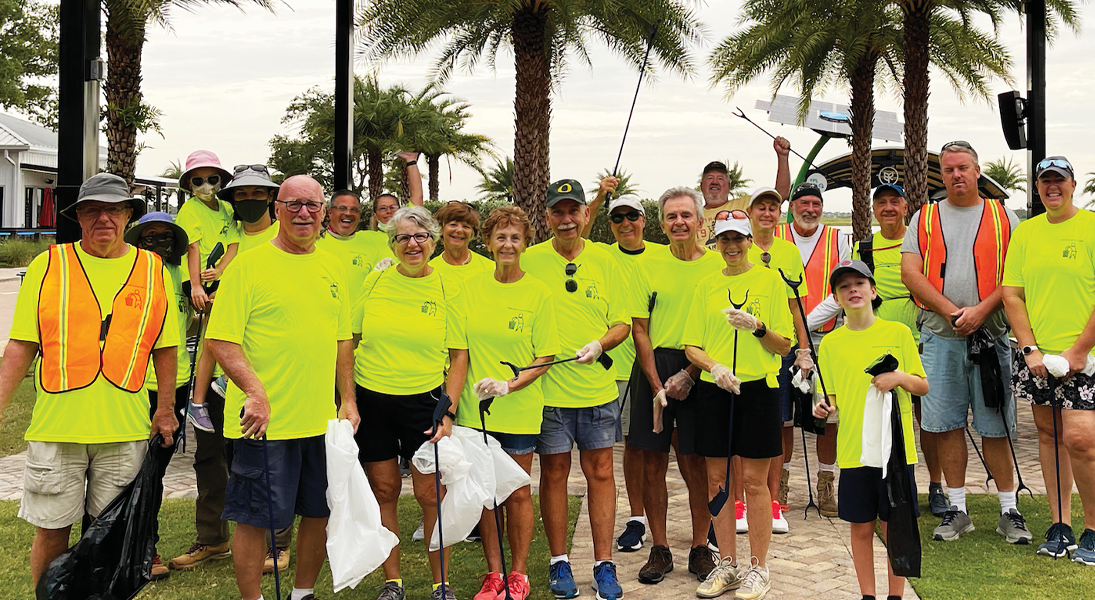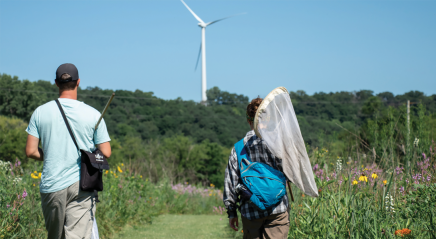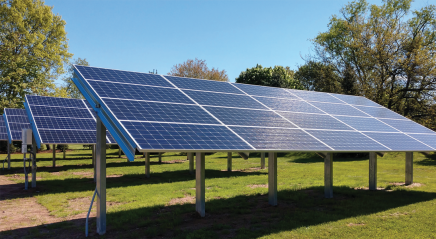The Community Church (TCC) is new in the rapidly growing town of Babcock Ranch, Fla. So is everyone else.
Home construction in Babcock Ranch, the nation’s first city built to run entirely on solar energy, began in 2016, with residents arriving a few years later. By March 2022, the population had hit 10,391, with developers planning for 50,000 residents.
TCC, a synod-authorized worshiping community, planted seeds in Babcock Ranch in fall 2020. Worship services quickly outgrew the community center, so the pastor, Matt Shapton, moved them to his house.
“We take all of our furniture out of our home on Saturday evenings,” he explained. “Volunteers help us set up chairs. . . . We can fit about 60 people in our house.” He described the service as fun and chaotic. “It’s becoming a big part of our story,” he said. “People now say to me, ‘We’re really going to miss it when we do have a church, because I love being in your house.’”
Members Lisa and Tom Hall have been with TCC since its beginnings. “There’s not a building, but there is a church here,” Lisa said. “The church is the people. It’s social, too, because they’re gathering with friends around shared needs and values. We’re meeting people where they’re at.”
“There’s not a building, but there is a church here. The church is the people.”
Services move outdoors when the weather permits. “It is so exciting to see so many new faces every week,” Tom said. “No matter how many chairs we put out, we need our lawn chairs, too, because we always seem to underestimate how many people will come.”
In keeping with the principles of the developing, eco-conscious community—and with ELCA emphases—TCC uses earth-friendly, reusable resources. “This is a brand-new city—a master-planned community,” said Shapton, who is serving his first call at TCC. “Creation care is at the heart of everything in Babcock Ranch.”
The concept took shape in 2006 with the purchase of 91,000 acres in southwest Florida’s Charlotte and Lee counties. Developer Kitson & Partners immediately sold 73,000 acres to the state and Lee County in the single largest land-preservation project in state history.
Kitson plotted the city on the remaining land: a blend of residential and commercial spaces and 880 acres of solar fields. The businesses, homes and entertainment venues are designed to attract residents who are passionate about stewardship and sustainability. One thing it doesn’t include, Shapton noted, is houses of worship.
“Coming from the Midwest—where, if you’re going to build a town, one of the first things you do is build a church—church is not on their radar here,” explained Shapton, a Michigan native. “So, we have created that desire for them and shown them the value of what faith community is. We’re trying to provide what a church provides the best way we can.”
Building community first
TCC’s approach blends tradition and innovation. Shapton intentionally chose the church’s name to convey an openness to all, regardless of previous backgrounds and experiences.
The congregation has already made a mark. “It was the middle of the COVID-19 pandemic, and people weren’t going to church in person,” Lisa said. “Pastor Matt was out there with his golf cart parked in Founder’s Square, handing out communion. It was without judgment or ‘Oh, do you qualify to take communion?’ It was there for anyone who came by. That was new for a lot of people.” This episode introduced Shapton to the community, she added, long before TCC’s first worship service.
Shapton also organized service projects and advertised them to residents through social media. “Instead of leaning into liturgy and worship, we actually leaned into building community first, through supporting local nonprofits,” he explained.
TCC now coordinates service opportunities at such area institutions as Crossroads Hope Academy, a foster care program; Valerie’s House, which offers grief-support programs to children and families; and South West Florida Horse Rescue, which saves horses from abuse, neglect and slaughter. In addition, TCC’s popular monthly community cleanup is endorsed by the Homeowners Association.
“Nothing I’m experiencing is what I learned of or was exposed to. . . . Every mission start comes with an unexpected element.”
Meanwhile, TCC’s worship sprang from its community-wide services for Easter and Christmas. “It’s bringing what people know of church from the previous towns to this new city, because it’s not here,” Shapton said. “A lot of people have kind of fallen out of the rhythm of their faith practices. We’re trying to reset that rhythm by being the church presence they’re familiar with, but at the same time open them up to some new possibilities of worship.”
In recent months, TCC began sending financial contributions to the Florida-Bahamas Synod, Lisa said, adding, “That was very important to us—a way to show we’re committed. We’re grateful for the support we’ve received from the synod and mission funds as well as individual congregations.”
Shapton, a Navy veteran and a building contractor before he attended seminary, draws on all his past experiences. “Nothing I’m experiencing is what I learned of or was exposed to,” he said. “I didn’t learn how to start a new congregation in a new city where there are no other churches; it is a learn-as-you-go opportunity. Every mission start comes with an unexpected element.
“Seminary gave me a good foundation and tools for community-driven ministry. . . . Starting small businesses has been useful experience. It’s not just about worship; it’s about starting the entity that is the church.”









